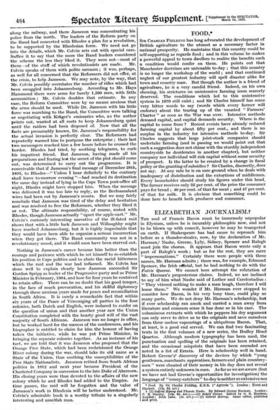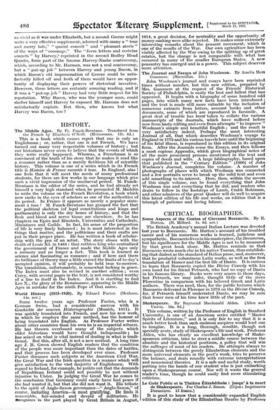ELIZABETHAN JOITRNALISM:t
Tim soul of Francis Bacon must be immensely unpopular in Elysium, unless he is incurably philosophic now, and not to be blown up with conceit, however he may be trumpeted on earth. If Shakespeare has had cause to reproach him before as a thunder-stealer, now, by the declaration of Mr. Harman,' Nashe, Greene, Lyly, Sidney, Spenser and Ralegh must join the chorus. It appears that Bacon wrote only a part of Ralegh's work ; but as for the rest, they are mere " impersonations." - Certainly there were people with these names, Mr. Harman admits ; there was, for example, Edmund Spenser, the Irish official, but he had nothing to do with the Earle Queene. We cannot here attempt the refutation of Mr. Harman's preposterous claims. Indeed, we are inclined to say of him what Nashe said of Luther and Carolostadius " They uttered nothing to make a man laugh, therefore I will leaue them." We wonder if Mr. Harman ever stopped to consider how Bacon, in his very busy time, could play so many parts. We do not deny Mr. Harman's scholarship, but if ever scholarship ran amok and carried a man away from literature and common sense it has done so in his case. The voluminous extracts with which he peppers his dry argument can only serve to drive us to the originals and save ourselves from these useless vapourings of a ubiquitous Bacon. That, at least, is a good end served. We can find two fascinating texts in the first volumes of a new series, the Bodley Head Quartos. Although modern typography has been used, the Punctuation and spelling of the originals has been retained, and the occasional misprints that have been emended are noted in a list of Errata. Here is scholarship well in hand. Robert Greene's' discovery of the devices by which "yong gentlemen, merchants, apprentises, farmers and plain countrey men " were cheated of their money in his day does not reveal a system entirely unknown in ours. Ai far as we are aware (but we have not had Greene's opportunities for investigation) the language of " conny-catchers " to-day is neither so extensive nor • Food. By Sir Charles Fielding, (" Agricola "). London : Hurst and Blaekett. [12e. 6d. net.) t (1) Galeria Harvey and Thomas Naehe. By Edward George Harman. London: C. B. Ouseley. [12s. ed. net.]—(2) Robert Greene. Edited by G. B. Harrison. Loudon ; dohn Late. [3a. pet.]—(3) Gabriel Harvey. Same editor, publishes and price.
so vivid as it was under Elizabeth, but a second Greene might write a very effective supplement, adorned with many a " true and merry tale," " quaint conceit " and " pleasant storie " of the ways of " coosnage." The " fovre letters and certeine sonnets " by Harvey,' reprinted in the second Bodley Head Quarto, form part of the famous Harvey-Nashe controversy, which, according to Mr. Harman, was not a real controversy, but a " put-up job " between Harvey and young Bacon, in which Bacon's old impersonation of Greene could be satis- factorily killed off and both of them would have an oppor- tunity of displaying their powers of rhetorical invective. However, these letters are certainly amusing reading, and if it was a " put-up job " Harvey had very little respect for his reputation. Why Bacon, who was the younger man, could shelter himself and Harvey be exposed Mr. Harman does not satisfactorily explain. But then, who knows but what Harvey was Bacon, too ?



































































 Previous page
Previous page